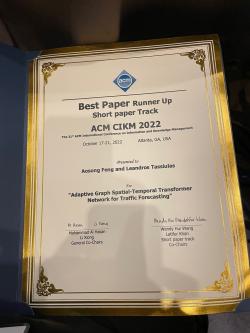Paper on Forecasting Computer Network Traffic Wins ACM Award

For a paper that outlines a new approach to forecasting computer network traffic, Prof. Leandros Tassiulas and graduate student Aosong Feng were awarded runner-up for Best Short Paper at the recent Conference on Information and Knowledge Management (CIKM) of the Association for Computing Machinery (ACM).
Forecasting traffic for computer networks is critical to such applications as bandwidth allocation and reducing congestion. However, it takes a massive amount of data from both the spatial and temporal domain.
 “This is a highly data-intensive activity,” said Tassiulas, the John C. Malone Professor of Electrical Engineering & Computer Science. “So we used neural networks—and specifically, graph neural networks with attention mechanisms—to capture the hidden spatial-temporal correlations in this data and developed learning procedures to infer network and traffic properties of the data.”
“This is a highly data-intensive activity,” said Tassiulas, the John C. Malone Professor of Electrical Engineering & Computer Science. “So we used neural networks—and specifically, graph neural networks with attention mechanisms—to capture the hidden spatial-temporal correlations in this data and developed learning procedures to infer network and traffic properties of the data.”
Graph neural networks, he said, are particularly suited to capture the structure of the actual network and embed data from such topological space.
“There is an embedded structure in the graph neural network that allows for more accurate mapping of a physical network,” he said. “It can encode the information of one node based on its neighbors, which proved to be a desirable property for making accurate predictions on networks.”
The more challenging problem is how to use the graph neural networks in the spatial domain to help the forecasting in the temporal domain, where the traditional algorithms like recurrent neural networks work well for single-node traffic forecasting.
“Future traffic of one node can be influenced by the past of itself, as well as its neighbors in the network,” he said. “We unified such correlations from both spatial and temporal domains by building the spatial-temporal graph. Compared to the separate modeling of spatial graph and temporal line, it includes cross-spatial-temporal correlations, which ended up being important for traffic forecasting.”
With the promising results, Tassiulas said, they will apply the same approach to see what other insights they can glean from it.
“We use this for predicting traffic, but we want see how well it works with predicting other network properties, so we’ll try to use this for managing all of the desirable aspects of the network,” he said.
The CIKM is an annual event that provides an international forum for the presentation and discussion of research on information and knowledge management, as well as recent advances on data and knowledge bases.

